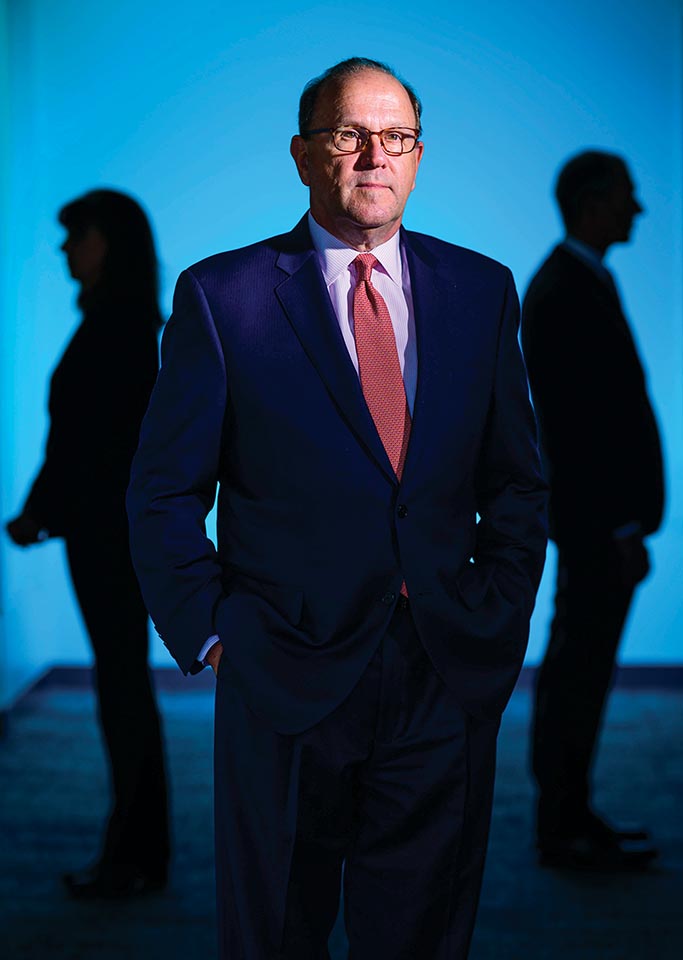
In mid-April, two weeks into his first vacation in a year, attorney Jerry Roscoe ’75 and his wife, Erika Chen, were about to embark on a cruise down the Danube River. Then he got the call: Could he mediate one of the most prominent lawsuits of 2023?
The case was Dominion Voting Systems v. Fox News. Dominion sued Fox for $1.6 billion, claiming the network knowingly broadcast false conspiracy theories that Dominion’s voting technology had rigged the 2020 election in favor of Joe Biden. Fox claimed the network had a right to report these topics as part of its constitutionally protected mandate to report news.
The case was only days away from what promised to be a costly and extended trial. And Roscoe, one of the most experienced and accomplished lawsuit mediators in the nation, was one of the few people the two sides were willing to work with.
He took the job.
“When I was brought up, I was taught that when parties need you, you respond,” he says.
Today, the 69-year-old attorney estimates he’s mediated more than 5,000 cases in a career of more than 30 years. These cases have spanned the breadth of the economy, from health care to manufacturing, government to the environment.
He mediated a lawsuit over a dioxin spill into groundwater in Australia, a wrongful death suit against NASA (by the family of a space shuttle maintenance worker killed on the job), a building collapse in Philadelphia, and a suit where rental-car customers were wrongfully arrested after faulty software accused them of stealing the vehicles. Many of these cases were class-action proceedings involving massive legal teams, with claims in the hundreds of millions of dollars.
Roscoe, who charges $1,250 per hour (slightly more on weekends and vacations), can often resolve these disputes in less than a day.
“In litigation, people just want to win,” he says. “They think, ‘I don’t care what it costs, it’s the principle.’ To a mediator, the parties have lost sight of what’s truly important to them. Once you can help people to understand what they need, you can create an entirely different set of options.”
A native of Huntington, Conn., Roscoe attended Colgate from 1971–75, where he triple-majored in political science, international relations, and German. He was also active on the debate and ski teams.
After graduation, he attended Catholic University Columbus School of Law at night. During the day, he worked full time as a special assistant for the U.S. Attorney’s office, plus a side gig lobbying for the needs of truckers and car-rental agencies during the late ’70s gas crisis.
He intended a career in torts. Then, in the mid-1980s, he went to a groundbreaking seminar on mediation run by the late Harvard Law School Professor Frank Sander, a pioneer in the field of alternate dispute resolution. Roscoe, who already had mixed feelings about the litigation process, found his calling.
“Lawyers were having trouble settling cases, and courts were starting to get crowded,” Roscoe says. “Even as a litigator, when I won a case, no one was really happy about it. The process took away resources, even on the winning side. I viewed it as destructive.”
Mediation, on the other hand, is a constructive process. And it may be the only path to satisfying all parties, he says.
Roscoe’s involvement in Dominion v. Fox brought him front-page attention, shining a rare spotlight on the power of alternative resolution techniques.
“Mediators do great work all the time, but no one knows they’ve done it,” says Michael Lewis, who has known and worked with Roscoe since the late 1990s.
Lewis said he could understand why Roscoe accepted the Dominion job, even though he was on vacation.
“You don’t get many opportunities to do something as important and well known as this case,” he says, adding: “Think of the logistical difficulties, the huge time differences. All he had was a phone; not even a tablet. And yet he managed to do it. Pretty staggering.”
On the cruise ship, Roscoe quickly consumed about a thousand pages of documents (“I know what to look for … key words and patterns,” he says). Over the next three days, he made dozens of phone calls to lawyers for both sides before reaching an agreement. In the end, Dominion agreed to settle for $787.5 million. While Fox was not required to apologize, the media company did state: “We acknowledge the Court’s rulings finding certain claims about Dominion to be false.”
Roscoe helped avoid a trial that might have taken six weeks, at the cost of millions of dollars, with potential ramifications on the future of media coverage.
And he was able to enjoy the last few days of his vacation in peace.
Roscoe dedicates this article to his former roommate, Doug Williams ’75, who passed away in May 2022. Roscoe says, “Doug was a history major who foresaw much of the Balkan instability that characterized that region in the 1990s.” Coincidentally, Roscoe went to Bosnia after the war to represent the U.S. State Department and help mediate lingering disputes in the region.
